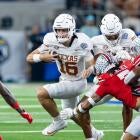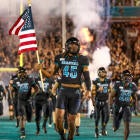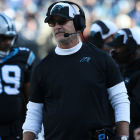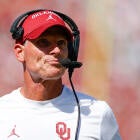Kirby Smart is torn. Georgia's coach believes players deserve a certain amount of transfer freedom. Excuse him, though, if he's not exactly celebrating the seven-month anniversary of the transfer portal this week.
"My biggest problem with the portal is that it gives kids an easy way out," Smart said. "I know the devil's advocate of players' rights and they should be able to go wherever they want to go. But I'm telling you, no normal parent would say, 'At the first sign of trouble, I want my son to run.'"
Welcome, then, to the first cautious baby steps of the new transfer environment. Beginning on Oct. 15, 2018, transferring athletes could no longer be "blocked" by their school or coach. They needed only notify the departing school that then put their name in the portal -- a secure database that has become a one-stop shop for roster enhancement.
Some have dispensed with the flowery language calling the portal college athletics' version of "free agency."
"It would be no different than the NFL saying, 'We have a scouting department for colleges, but we [also] have a scouting dept for free agents,'" Smart said. "The NFL free agent market means [they] have to evaluate these 20 free agents. We just happen to have a larger pool, which is the portal."
There are almost as many questions about the portal as FBS football players in it -- 720 at the time this story is being printed, as compiled unofficially by 247Sports.
Rosters can be wrecked and rebuilt. Smart himself lost 2018's No. 1 recruit, quarterback Justin Fields, to Ohio State.
"No regrets," Smart said forcefully. "I would go recruit the best player [again]."
Call it transfer roulette. No one seems to know where it's all headed. It's difficult to have sympathy for coaches when their biggest headache is "roster management."
But there is also that ethical, psychological, loyalty component to it: Be a man. Finish what you started.
Coaches preach it until they don't and leave for the next best job overnight. A bit of hypocrisy at work there?
As for loyalty, you won't find the following phrase written in large type on the portal: A school doesn't have to renew the scholarship of any player who places his name in the portal.
"When you do that, we have the ability to take your grant-in-aid away," said Arizona State coach Herm Edwards. "You better understand that. … Once your name hits the portal, you're basically saying, '[I'm gone].'"
Smart has a more succinct summary of that process.
"Once we see you're in the portal, you can be cut," Smart said.
CBS Sports has spent the past few weeks gathering reactions to the first seven months of the portal's existence. It's obvious coaches, administrators and players are still trying to figure it out.
Here is look from the portal battlefront.
Ryan Day, Ohio State coach: "We want to recruit and develop guys. However, the portal has kind of changed things. We've tread carefully in that world. We thought Justin [Fields] was a fit for a lot of reasons.
"When Dwayne Haskins leaves as a sophomore, we think he has three years left, and he comes for one and throws 50 TD passes. He's a first-round draft pick. He left things uneasy, almost a mess. We kind of had to figure all that out in short order. When Justin became available, it made sense. We didn't know if he'd get the waiver or not."
Fields is among a number of high-profile players who won their transfer waiver appeals for immediate eligibility. NCAA rules allow undergraduate transfers to skip the year-in-residence requirement if they can prove "extenuating circumstances outside an athlete's control." Those waivers are separate from the portal discussion.
Todd Berry, American Football Coaches Association executive director: "The portal isn't the problem. It's the leniency of the waivers that's the problem. … Some are transferring for the right reasons. There are others who just broke up with their girlfriend and want to go back and get things right. That doesn't always work out, then they come back two months later wanting to come back on the team. Where the leniency came from was surprising to everyone this year."
In reality, waiver appeals continue to be granted at the same rate as they have recent years -- approximately 65-75 percent are granted.
Lincoln Riley, Oklahoma coach: "It's added a waiver wire for us. Then you gotta be really smart about your spots. Right now, we don't have a good system to fill those spots. Especially when you get a team like us, you've got the portal to deal with, which is a great thing, but we've got a bunch of guys leave early to go to the draft."
Riley got one of this offseason's biggest portal prizes in graduate transfer quarterback Jalen Hurts from Alabama.
Kirby Smart, Georgia coach: "A lot of small colleges are saying, 'I'll just go recruit the portal and stop signing kids.' … We would never do that because we're not bottom feeders. I've talked to some guys at that level -- I'm not going to repeat their names. They'll say, 'We're just going to save all our scholarships. Instead of signing a 25-man class, we'll sign five of the best high school players we can and then go sign 20 out of the portal.'"
Most of the above scenario would have to do with FBS players transferring to lower divisions. FBS players are eligible immediately if they go, for example, to FCS or Division II.
Bill Moos, Nebraska athletic director: "I sat in a Big Ten meeting about eight, nine weeks ago. What worries me we'll be sitting in this room in two years talking about free agency and salary caps. I'm going back to the ranch when that happens."
Don't know about paying players, but the Cornhuskers did take a hit in the transfer portal. Eleven Huskers entered the portal in the offseason, according to 247Sports.
Berry, AFCA executive director: "The idea that [players are] walking away and we're transferring as coaches [is wrong]. We're not. Most of us are owing a $2 million [buyout] to the institution that we're leaving."
Please don't compare transfers to millionaire coaches. That's two different types of freedoms. That buyout is usually paid for by a coach's new employer and certainly doesn't dissuade him from leaving. Market forces decide coaches' salaries. Arcane and sometimes arbitrary rules have governed uncompensated players' ability to transfer.
Clay Helton, USC coach: "I'm hoping kids get educated on it. With it being new this year, I think it went over the top. … I've got to figure there will be a lot of people without homes."
Although unofficial, that 247Sports transfer portal list shows approximately 400 of those 720 FBS players have yet to find a new school.
Herm Edwards, Arizona State coach: "It's caught a lot of kids by surprise in the fact that a lot of guys don't have scholarships. There's a little bit now, 'Whoa, what just happened?' I think they assumed their name is in the portal, 'I'll get a scholarship somewhere else.' The unintended consequence has hit them in the face."
One concern of coaches is roster depletion -- not having enough players. Edwards has lost at least eight players to the portal, gaining only one, according to 247Sports. That severely impacts his ability to keep the limit of 85 scholarship players. Some coaches have quietly suggested programs get an extra scholarship for every player they lose to the portal.
Smart, Georgia coach: "[The transfer issue is], 'Where are you going to go to get developed the best?' But that's not the society we live in. We live in the, 'Me, now, I want mine now. I want to go play right now.'"
Love it or hate it, that's why the portal is here.
![[object Object] Logo](https://sportshub.cbsistatic.com/i/2020/04/22/e9ceb731-8b3f-4c60-98fe-090ab66a2997/screen-shot-2020-04-22-at-11-04-56-am.png)

















